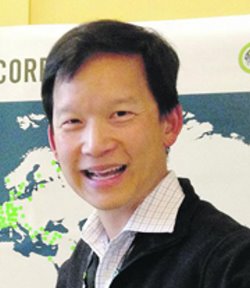
| ||||||
Kwok was one of three finalists interviewed at the Aug. 24 meeting. Other candidates included Farschad Farzan and Karen Maggio. Kwok will serve on the city council until the next regularly scheduled municipal election in November 2022.
Kwok for 17 years successfully pursued a career as a diversity and cross-cultural community consultant before pivoting his vocational focus and working for over a decade in the solar and renewable energy field. He has a Bachelor of Arts in economics and political science from Yale University and is the parent with his wife, Violet Kwok, of one daughter and one son. The Kwok children attended Happy Valley Elementary School, Stanley Middle School, and Acalanes High School. Kwok has served on a subcommittee of the Lafayette Environmental Task Force and has been an active member of the Lafayette Community DEI (diversity, equity, and inclusion) Committee. He is past president and a four-year member of Sustainable Lafayette.
At the July 12 council meeting, Srivatsa noted the vacancy was required to be filled within 60 days of Burks' June 28 resignation; Kwok's appointment on Aug. 24 met the 60-day deadline.
The council during the interview process received approximately 21 comments prior to the Aug. 19 meeting and 26 comments submitted before the final meeting on Aug. 24, and the council mentioned frequent conversations and written or survey feedback from people in the community about the process, the candidates, and about their priorities as residents of Lafayette.
Kwok in his answers to council members' questions repeatedly emphasized listening to a diversity of voices and considering written communications and feedback from surveys with open minds to ensure the community will "drive the roadmap forward." He emphasized an organic, humanistic approach that avoided codifying survey data and said if the city and its people send an aggregate message demonstrating continued interest in maintaining open spaces, supporting a lively, likable and walkable downtown core, funding and participating in area schools' educational strength and reputation, actively preserving a sustainable environment while meeting State requirements for residential housing, encouraging commercial development with safety, the climate and density in mind, and more - those metrics when reconciled with the General Plan should constitute the city's mission and vision.
Asked specifically a number of questions about state versus local land control, Kwok said he strongly favors local control. Tying his response on housing to his highest priorities - wildfire safety and the drought, two issues he said will not be solved quickly - he suggested Senate Bill 9 (SB9) is legislative overreach. By rezoning parcels throughout the city and spreading increased density into areas with already congested arterial roads, Kwok said the state's "one size fits all approach might be easiest, but it isn't best." Instead, he advocates for Lafayette to renegotiate housing element increases of just over 2,000 to more reasonable numbers and continue to advocate for local control when it comes to zoning.
As an advocate for centering most of the density increases in the downtown core, Kwok said a stronger infrastructure must be built to preserve pedestrian and traffic safety, especially near schools, and funding must be adequate to improve and meet demands for greater city services such as water, sewer and electrical systems.
Referencing past sales tax measures and general obligation bonds that voters in Lafayette have failed to pass, Kwok said, "We have priorities, but we're not willing to fund them." The comment, while critical, came with context as Kwok acknowledged that bond measures not adequately made specific to their application are not likely to pass. He said more likely to pass are revenue bonds that would, for example, be connected to having city-owned, revenue-generating businesses become a part of future development of Lafayette Square. Collaborations with other cities to obtain federal funding for larger infrastructure projects such as rebuilding roads offered additional possibilities, according to Kwok. He is hopeful that good vision and strong communication efforts will produce willingness for registered voters to approve sales tax or bond measures.
In written comments submitted to the council Kwok issued statements supporting making Lafayette a zero-carbon city by 2040. Bolstering a diverse downtown core that is walkable and offers a blend of residential and commercial opportunities is a priority; with emphasis on climate crisis solutions, environmental justice, and improving social and racial divisiveness in part through more affordable housing. Overall, Kwok cast himself as a practical person who will bring to the council new ideas for facing the unprecedented challenges as society emerges from the pandemic and addresses systemic racial inequities.
Council Member Gina Dawson said Kwok brought a "needed voice" and is "in tune" with the community. Vice Mayor Teresa Gerringer said he is a "forward vision thinker." Mayor Candell remained concerned his differences in policy positions from her own would prove to be an obstacle. Council Member Carl Anduri, after delivering strong support for the experience and policy positions of candidate Karen Maggio, joined with Gerringer and Dawson to support Kwok.
After being sworn in, Kwok said he appreciated commentary from the council and members of the community during the process and was grateful and humbled by the enthusiastic volunteerism of council members and people in Lafayette. He said it's important to remain open to learning, changing his mind when called for, and he pledged to give thoughtful consideration to all viewpoints.
Reach the reporter at:
